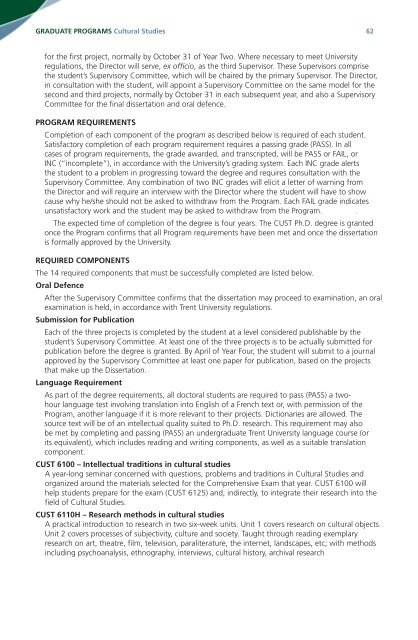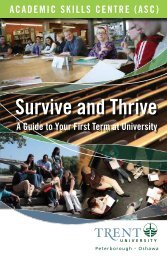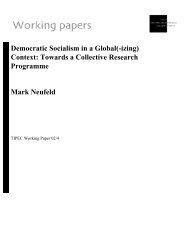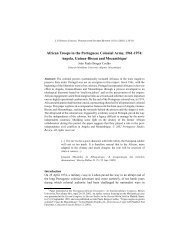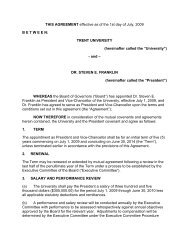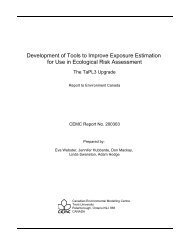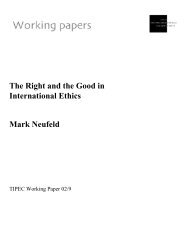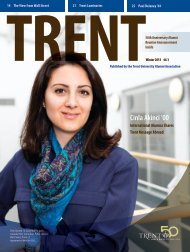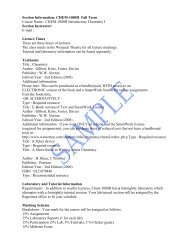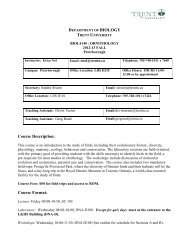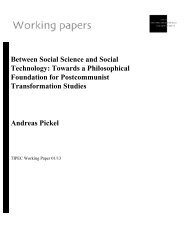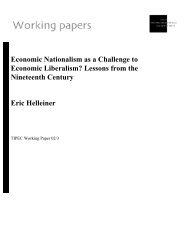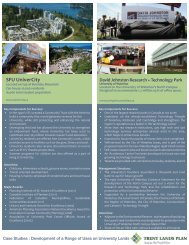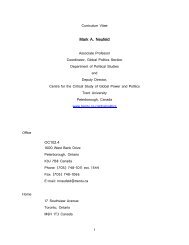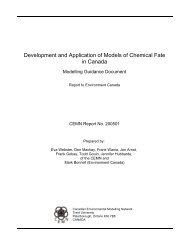Graduate academic calendar 2012 - 2013 - Trent University
Graduate academic calendar 2012 - 2013 - Trent University
Graduate academic calendar 2012 - 2013 - Trent University
You also want an ePaper? Increase the reach of your titles
YUMPU automatically turns print PDFs into web optimized ePapers that Google loves.
GRADUATE PROGRAMS Cultural Studies<br />
62<br />
for the first project, normally by October 31 of Year Two. Where necessary to meet <strong>University</strong><br />
regulations, the Director will serve, ex officio, as the third Supervisor. These Supervisors comprise<br />
the student’s Supervisory Committee, which will be chaired by the primary Supervisor. The Director,<br />
in consultation with the student, will appoint a Supervisory Committee on the same model for the<br />
second and third projects, normally by October 31 in each subsequent year, and also a Supervisory<br />
Committee for the final dissertation and oral defence.<br />
PROGRAM REQUIREMENTS<br />
Completion of each component of the program as described below is required of each student.<br />
Satisfactory completion of each program requirement requires a passing grade (PASS). In all<br />
cases of program requirements, the grade awarded, and transcripted, will be PASS or FAIL, or<br />
INC (“incomplete”), in accordance with the <strong>University</strong>’s grading system. Each INC grade alerts<br />
the student to a problem in progressing toward the degree and requires consultation with the<br />
Supervisory Committee. Any combination of two INC grades will elicit a letter of warning from<br />
the Director and will require an interview with the Director where the student will have to show<br />
cause why he/she should not be asked to withdraw from the Program. Each FAIL grade indicates<br />
unsatisfactory work and the student may be asked to withdraw from the Program. .<br />
The expected time of completion of the degree is four years. The CUST Ph.D. degree is granted<br />
once the Program confirms that all Program requirements have been met and once the dissertation<br />
is formally approved by the <strong>University</strong>.<br />
REQUIRED COMPONENTS<br />
The 14 required components that must be successfully completed are listed below.<br />
Oral Defence<br />
After the Supervisory Committee confirms that the dissertation may proceed to examination, an oral<br />
examination is held, in accordance with <strong>Trent</strong> <strong>University</strong> regulations.<br />
Submission for Publication<br />
Each of the three projects is completed by the student at a level considered publishable by the<br />
student’s Supervisory Committee. At least one of the three projects is to be actually submitted for<br />
publication before the degree is granted. By April of Year Four, the student will submit to a journal<br />
approved by the Supervisory Committee at least one paper for publication, based on the projects<br />
that make up the Dissertation.<br />
Language Requirement<br />
As part of the degree requirements, all doctoral students are required to pass (PASS) a twohour<br />
language test involving translation into English of a French text or, with permission of the<br />
Program, another language if it is more relevant to their projects. Dictionaries are allowed. The<br />
source text will be of an intellectual quality suited to Ph.D. research. This requirement may also<br />
be met by completing and passing (PASS) an undergraduate <strong>Trent</strong> <strong>University</strong> language course (or<br />
its equivalent), which includes reading and writing components, as well as a suitable translation<br />
component.<br />
CUST 6100 – Intellectual traditions in cultural studies<br />
A year-long seminar concerned with questions, problems and traditions in Cultural Studies and<br />
organized around the materials selected for the Comprehensive Exam that year. CUST 6100 will<br />
help students prepare for the exam (CUST 6125) and, indirectly, to integrate their research into the<br />
field of Cultural Studies.<br />
CUST 6110H – Research methods in cultural studies<br />
A practical introduction to research in two six-week units. Unit 1 covers research on cultural objects.<br />
Unit 2 covers processes of subjectivity, culture and society. Taught through reading exemplary<br />
research on art, theatre, film, television, paraliterature, the internet, landscapes, etc; with methods<br />
including psychoanalysis, ethnography, interviews, cultural history, archival research


